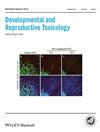Effect of fructose on the phosphorylation of AMP-activated protein kinase and acetyl-CoA carboxylase in HepG2 cells stimulated with placental lactogen.
Q Environmental Science
Birth defects research. Part B, Developmental and reproductive toxicology
Pub Date : 2016-08-01
DOI:10.1002/bdrb.21186
引用次数: 3
Abstract
BACKGROUND High fructose intake induces disruption of lipid metabolism via AMP-activated protein kinase (AMPK) signaling in the liver and peripheral tissues. Maternal lipid metabolism is physiologically altered by the activity of pregnancy hormones such as human placental lactogen (PL). To elucidate the influence of high fructose intake on hepatic lipid metabolism during pregnancy, we examined the effects of fructose on lipid metabolism via the AMPK pathway in hepatocytes stimulated with PL. METHODS Human hepatoma cells (HepG2) were treated with D(-)-fructose in the presence or absence of PL. Intracellular lipid contents were measured. The total and phosphorylated protein content of AMPK and acetyl-CoA carboxylase (ACC) was quantified by Western blotting. RESULTS The intracellular triacylglycerol level in fructose-treated HepG2 cells decreased significantly compared with that in untreated cells in the presence, but not absence, of PL. AMPK and ACC phosphorylation increased significantly and concentration-dependently in fructose-treated HepG2 cells in the presence of PL. CONCLUSION Our results suggest that fructose treatment reduces triacylglycerol levels via AMPK/ACC signaling in PL-stimulated hepatocytes. These findings suggest that high fructose intake during pregnancy might impair lipid metabolism in the maternal liver.果糖对胎盘乳原刺激HepG2细胞amp活化蛋白激酶和乙酰辅酶a羧化酶磷酸化的影响。
高果糖摄入通过肝和外周组织中amp激活的蛋白激酶(AMPK)信号通路诱导脂质代谢的破坏。母体脂质代谢是由妊娠激素如人类胎盘乳原(PL)的活性生理改变。为了阐明高果糖摄入对妊娠期肝脏脂质代谢的影响,我们研究了果糖在PL刺激下通过AMPK途径对肝细胞脂质代谢的影响。方法在存在或不存在PL的情况下,用D(-)-果糖处理人肝癌细胞(HepG2),测量细胞内脂质含量。Western blotting检测AMPK和乙酰辅酶a羧化酶(ACC)的总蛋白和磷酸化蛋白含量。结果果糖处理的HepG2细胞细胞内甘油三酯水平与未处理的HepG2细胞相比显著降低,而果糖处理的HepG2细胞中AMPK和ACC的磷酸化水平在果糖存在的情况下呈浓度依赖性增加。结论果糖处理通过AMPK/ACC信号通路降低了甘油三酯水平。这些发现表明,怀孕期间摄入高果糖可能会损害母体肝脏的脂质代谢。
本文章由计算机程序翻译,如有差异,请以英文原文为准。
求助全文
约1分钟内获得全文
求助全文
来源期刊
CiteScore
1.65
自引率
0.00%
发文量
0
审稿时长
>12 weeks
期刊介绍:
The purpose of this journal is to publish original contributions describing the toxicity of chemicals to developing organisms and the process of reproduction. The scope of the journal will inlcude: • toxicity of new chemical entities and biotechnology derived products to developing organismal systems; • toxicity of these and other xenobiotic agents to reproductive function; • multi-generation studies; • endocrine-mediated toxicity, particularly for endpoints that are relevant to development and reproduction; • novel protocols for evaluating developmental and reproductive toxicity; Part B: Developmental and Reproductive Toxicology , formerly published as Teratogenesis, Carcinogenesis and Mutagenesis

 求助内容:
求助内容: 应助结果提醒方式:
应助结果提醒方式:


